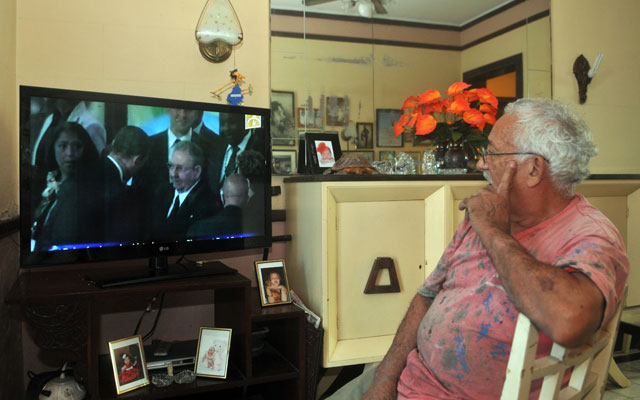President Obama Shakes Hands with Cuban Dictator
Ana Quintana /

A man in Havana, Cuba, watches President Obama greet Raul Castro. (Photo: Ernesto Mastrascusa/EFE/Newscom)
Earlier today at Nelson Mandela’s memorial service, President Obama shook hands with Cuba’s dictator, Raul Castro. This exchange marks the third time in history that leaders of these respective countries have exchanged public greetings; the first handshake occurred at the United Nations in 2000, between Bill Clinton and Fidel Castro, and long before that in 1959, when Vice President Richard Nixon met with the Cuban tyrant on his visit to the United States.
Today’s poorly judged and hugely controversial handshake was a much-needed public relations victory for the Castro regime, at a time when it has come under increasing fire over its appalling human rights record and its dealings with the rogue regime in Pyongyang.
The Cuban regime’s image has been further tarnished in recent months, with its violation of U.N. Security Council sanctions and the now four-year detainment of former USAID contractor and U.S. citizen Alan Gross.
Cuba’s military engagement with fellow rogue regime North Korea is also of concern to the United States. A Cuban weapons cache stocked with anti-aircraft missiles, jet parts, and other illicit weapons was discovered by Panamanian authorities as it attempted to covertly pass through the Panama Canal in July of this year. Destined for North Korea, the weapons were buried under 10,000 tons of sugar and went undeclared on the cargo’s manifest. U.N. Security Council Resolution 1718 explicitly prohibits member states from providing North Korea with “any battle tanks, armoured combat vehicles, large calibre artillery systems, combat aircraft, attack helicopters, warships, missiles or missile systems.”
If Cuba is formally found to be in violation of the UNSC resolution, this will be the first time in history a country in the Western Hemisphere is found guilty of weapons proliferation.
The Castros have found their international charm offensive to be an uphill battle, and the photo op provided by President Obama’s handshake has provided them with much-needed momentum. The White House needs to recognize how its actions provide the veneer of legitimacy to the Cuban regime and how its statements essentially contradict its own declared foreign policy.
Rather than providing Raul Castro with a friendly greeting and a great opportunity for the Cuban dictatorship’s PR machine, Barack Obama could have questioned him on:
1. Alan Gross, the former USAID contractor and U.S. citizen rotting currently rotting in a Cuban prison;
2. The regime’s continuous repression of free speech and open space for political dialogue;
3. The more than 70 political prisoners the country still has incarcerated;
4. Cuba’s 50+ years without elections;
5. Cuba’s horrific track record on human rights and the country’s designation as one of the most dangerous places for independent journalists and civil society in the world; or
6. Cuba’s violation of U.N. Security Council sanctions by providing North Korea with a weapons cache this past summer.
A reproach from the U.S. president, not a handshake, should have been the order of the day in South Africa.
